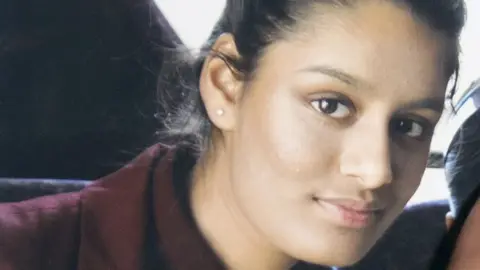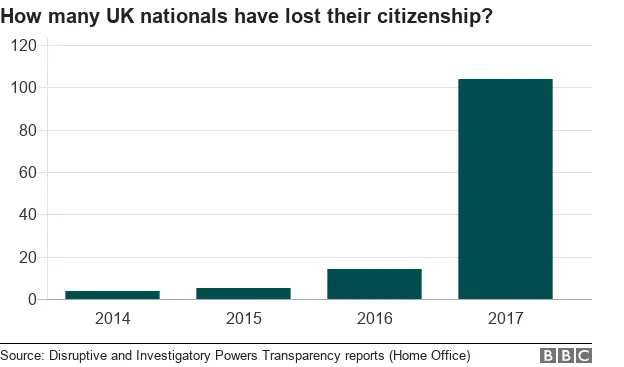Shamima Begum: Lawyer says teen was 'groomed'
The lawyer representing Shamima Begum's family has written to the home secretary accusing UK authorities of failing to protect the east London girl from being "groomed" by Islamic State.
The letter accuses police and her local council of failing to safeguard the teenager, who left for Syria in 2015.
The government stripped Ms Begum of her UK citizenship in February - a decision her family has said it will appeal.
The Home Office said it "does not routinely comment on individual cases".
The lawyer, Tasnime Akunjee, said Home Secretary Sajid Javid's decision was a "politically-driven abuse of power" to try to further his "own personal political objective" of becoming prime minister.
Shamima left the UK at the age of 15 alongside two fellow Bethnal Green Academy pupils, 15-year-old Amira Abase and 16-year-old Kadiza Sultana.
She was found in a Syrian refugee camp by a Times journalist in February this year. She was heavily pregnant with her third child and said she wanted to return home.
She has since been granted legal aid to fight the decision to revoke her British citizenship.
In the letter, seen by the BBC, lawyer Mr Akunjee claims the family was not told that Shamima had been interviewed by police when another girl at the same school left for Syria the previous December.
Had they known, he says, the family would have been able to stop Shamima from following her.
The letter makes the point that police interviewed seven friends of this first Bethnal Green runaway schoolgirl, whom the lawyer says had been "groomed for exploitation and trafficked internationally".
But the police spoke to these seven girls, including Shamima, Amira and Kadiza, without the knowledge or consent of their parents.
The lawyer says that by questioning the girls without their parents, they were effectively put on notice that "they were being monitored and would have to leave for Syria immediately".
The letter says that it was only after Shamima, Amira and Kadiza also ran away that Tower Hamlets Council took the decision to make the four remaining girls in the friendship group wards of court to protect them from the consequences of potential radicalisation.
Calling the chain of events "arguably the worse case of child radicalisation in the western hemisphere", the letter criticises Tower Hamlets Council for having yet to launch a serious case review, conducted when a child has been abused or neglected and suffered serious harm as a result.
Moving on to Home Secretary Sajid Javid's decision to revoke Begum's citizenship, Mr Akunjee contends that the government has "neglected to consider the failings of the UK government, which led to Ms Begum becoming a child victim of trafficking".
Addressing the Conservative leadership contender, he wrote: "Your act represents the most profoundly egregious, capricious and politically-driven abuse of power."
"It was a unilateral response... deployed as an artifice or device to further your own personal political objective of being prime minister. Ms Begum was a pawn to your vanity."
The letter says Ms Begum was "born, raised, groomed and radicalised here in the UK", and should not be left for another country to deal with.
The decision to strip her of her British citizenship was unlawful, "unprincipled" and a "knee-jerk reaction to the media furore", it adds.
"Your cynical decision amounts to human fly-tipping."
 PA
PAOne passage of the 16-page letter quotes Shamima Begum's sister, Renu Begum, who says the family has "suffered loss so many times".
She says the family lost "a niece and nephew we never met", referring to the first two children Shamima said she had in Syria.
Shamima told the BBC in February that both children had died.
She went on to have another child after being found in the al-Hol refugee camp in Syria. The baby was less than three weeks old when he died of pneumonia, according to officials in the camp.
Renu Begum says: "When Shamima was found in al-Hol, we had hope that we could rebuild something of our family. Sajid Javid stole that from us."
The Home Office declined to comment on the letter.
But it said any decisions to deprive individuals of their citizenship are based on all available evidence and not taken lightly.
A spokesman for Tower Hamlets Council said the case "did not meet the threshold for a serious case review".
Instead the council provided "in-depth support to the school, its staff, parents and pupils in order to investigate what had happened and stop others following in their footsteps".
Commander Clarke Jarrett, head of the Metropolitan Police's Counter Terrorism Command, said: "Our focus was not to criminalise anyone, but to prevent tragedies and support the girls and their families. Our priority and focus from the moment the girls were reported missing was their safety and wellbeing."

Nikita Malik, from the Henry Jackson Society, a think tank that advocates the spread of liberal democracy, said the UK must be "very careful employing terms of victimhood to individuals who have joined terrorist organisations".
"Islamic State trafficked several Yazidi women into sexual slavery and forced marriage," she said.
"This is a different scenario to Shamima Begum and other individuals who chose to travel to Syria."
"We must not forget that a decision was made to join a terrorist organisation and this comes with consequences that can only be determined through due process, evidence, and a court to decide the level of participation that Shamima Begum played in Islamic State."
